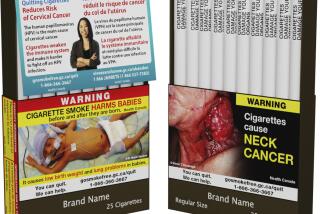HEALTH : FDA Urges New Aspirin Warning
- Share via
The U.S. Food and Drug Administration on Thursday proposed a tougher warning label for aspirin that would urge women to avoid aspirin in the last three months of pregnancy.
The agency also proposed new labeling for acetaminophen, another popular over-the-counter pain reliever used in such products as Tylenol and Anacin-3, that would strengthen an existing warning that consumers should seek treatment quickly if they take an accidental overdose.
Both proposals represented evolutionary change in FDA requirements for consumer warnings on common pain relief products. Aspirin makers have been required since 1986 to include warnings that children and teen-agers should take aspirin only with the consent of a physician because of the danger of developing Reyes Syndrome, a frequently fatal flu-like disorder.
Significant Risk
The FDA said the expanded aspirin warning was necessary because an FDA panel reviewing a wide variety of over-the-counter medications concluded there is a significant risk of bleeding in women who use aspirin in the last three months of their pregnancies. Such bleeding, the FDA said, can increase the time a woman spends in labor and may adversely affect bleeding and clotting in both the mother and the newborn.
An FDA spokeswoman said reliance on the required extended public comment periods could mean the two new warning labels would not start to appear for as much as 2 1/2 years. However, manufacturers would be free to include them any time on their products voluntarily.
Acetaminophen labels already instruct consumers to consult a physician or a poison control center in the event of overdose. The drug can cause severe liver damage, especially in people--alcoholics, in particular--with pre-existing liver conditions.
Overdoses are sometimes not immediately accompanied by symptoms, but Thursday’s FDA proposal would require acetaminophen product labels to urge prompt medical attention after an overdose whether symptoms develop or not.
The FDA also noted Thursday that an advisory committee is continuing to work on new aspirin labeling, to be sent to physicians, that would take note of recent research linking frequent use of aspirin to a possible decreased heart attack risk. The finding, which is the subject of controversy among doctors, is undergoing final review by the government panel.
In contrast to the aspirin warning label for Reyes Syndrome, which was resisted by aspirin manufacturers for more than four years before the FDA finally ordered it included in packaging, the new FDA proposals appeared to have evolved quietly from the long-standing internal agency review of consumer medicines.
‘Sensible’ Action
The Reyes Syndrome label was originally demanded in a 1982 petition by the Health Research Group, a Washington-based consumer organization. Dr. Sidney Wolfe, the organization’s head, said Thursday’s announcement of new warning label proposals for aspirin and acetaminophen both represented “sensible” action by FDA.
Wolfe said the two label changes were unrelated. He noted that people with severe pre-existing liver disease or people who take very large overdoses of acetaminophen are at high risk of suffering irreversible liver damage.
Spokesmen for Sterling Drug Inc., the New York-based parent company of Bayer Aspirin, said they had not seen the FDA proposal and could not comment on it. A spokesman in Spring House, Pa., for McNeil Pharmaceutical, the maker of Tylenol, was not available to comment on the FDA action. Spokespersons for the Aspirin Foundation, a pain reliever trade group, did not return calls from The Times.
The aspirin warning label would read: “IMPORTANT: Do not take this product during the last three months of pregnancy unless directed by a doctor.” Acetaminophen users would see a modified warning reading: “In case of accidental overdose, contact a physician immediately. Prompt medical attention is critical for adults as well as for children even if you do not notice any signs or symptoms.”






